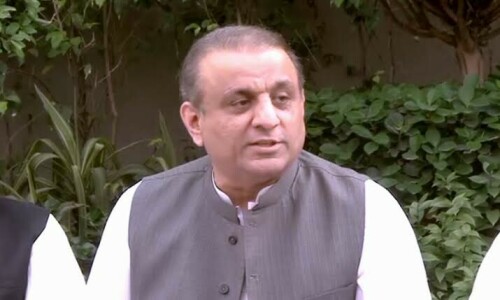WE as a society do not speak the truth and do not like to hear the truth. The habit of being mendacious is deeply rooted in our collective social behaviour, perpetuated by a system that seems to thrive on deceit. The natural corollary of this habit is not honouring one’s word or promise.
From a political leader, a judge, a civil or a military bureaucrat, a businessman and a lawyer, the tendency to breach commitments trickles down to the ordinary man. This aspect of Pakistani society is underrepresented and unaddressed. Normatively, agreements, promises and contracts govern the relationship between individuals and the state, and transnational actors.
Let’s take the legal profession as a case study. Generally, an ordinary day in our society, and in particular in the legal practice, begins with a lie — or, it would be appropriate to say, a series of lies. Why don’t we speak the truth? It is so common that no one even cares, and even seniors encourage their pupils to carry out a certain kind of ‘smart work’, which means unnecessary adjournments. The lawyers in an adversarial system represent the best interest of the client, and this too is often disregarded, where inefficient work causes delays and jeopardises the client’s interests. Discussing our political and judicial history in detail is beyond the scope of this article, but suffice it to say, misrepresentation and fraud are rampant.
Primarily, every litigation typically arises from a failure to fulfill contractual promises; the collective habit of flouting promises has burdened the judicial system with 2.5 million cases — the figure was mentioned by Justice Mansoor Ali Shah in his recent speech at the Federal Judicial Academy. The lack of contractual fulfilment has created a trust deficit; a deficit where foreign investors may negotiate profit sharing but never negotiate on the dispute-resolution clause. Pakistan has a population of 240m, with 2.5m cases and 5,000 judges. If these 2.5m cases are not decided on time, then it simply is injustice. Why are the cases on the docket for such a long time? One reason is that the system tends to drag its feet due to inefficiencies in case management.
An overhauled system can ensure a balance between the government and citizens.
A possible solution for such a backlog is to have a robust case management system with the help of technology. However, the deep-rooted problem in our society is the failure to honour promises at all levels of interactions and therefore, our system has failed to ensure speedy justice. Thus, even for the sake of economic progress, cases need to be resolved at the earliest. The example of the legal profession has been given here to facilitate a better understanding of the gravity of this societal predicament. Rest assured, any profession can fit perfectly in this model when it comes to dealing with deceitful practices.
Justice extends beyond deciding a matter. It must also strengthen the whole system so that justice is ultimately served. But that is not the case here in Pakistan. An average case may easily take 10 to 20 years to get decided from the first court to the Supreme Court — a whole generation is wasted in litigation.
Addressing this plague requires recognising the problem and implementing comprehensive solutions. The major symptom is overarching in nature and is the prevalent cause of the problem. The contracts that people enter into hold
enormous sanctity and should be execu-ted in good faith to eliminate the possibilities of dispute that snowball into litigation. We need a structural overhaul that encourages truth and incentivises respect for commitments.
Imagine if politicians start keeping their promises, if ‘undemocratic elements’ adhere to the oath they take, if judges strictly follow the timelines stipulated in procedural laws, if lawyers are fair to their clients, if businesses honoured their contracts, if parties are made to internalise the sanctity of contracts. Such changes would boost commercial activities and reduce litigation.
A society with a colonial past cannot be solely mended through individualistic narratives. Only a collective overhaul of the system can ensure a balance between the government and its citizens, with both sides honouring their commitments. This is because the relationship between the state and its citizens is a two-way street, and it takes two to tango. This approach may not yield results in a few months. In fact, it will require a long-term process to counter the plague of deceit in our society. If the current situation persists, it will remain an exercise in futility, akin to treating symptoms without addressing the deep-seated malaise.
The writer is a lawyer based in Islamabad.
Published in Dawn, August 31st, 2024












































Dear visitor, the comments section is undergoing an overhaul and will return soon.